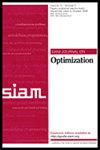用于计算鞍点的稳健加速原始双方法
IF 2.3
1区 数学
Q1 MATHEMATICS, APPLIED
引用次数: 0
摘要
SIAM 优化期刊》,第 34 卷,第 1 期,第 1097-1130 页,2024 年 3 月。 摘要。我们考虑了强凸-强凹鞍点问题,假设我们可以获得梯度的无偏随机估计。我们提出了一种随机加速初等二元算法(SAPD),并证明使用恒定初等二元步长生成的 SAPD 序列线性收敛于唯一鞍点的邻域。我们将邻域的大小解释为对梯度噪声的鲁棒性度量,并根据 SAPD 参数和问题常数获得了鲁棒性的明确特征。基于这些特征,我们开发了计算简单的技术,用于优化 SAPD 参数,即原始步长和对偶步长以及动量参数,从而在帕累托曲线上实现收敛速度和鲁棒性之间的理想权衡。这使得 SAPD 既能享受快速收敛特性,又能作为一种加速方法对噪声保持稳健。SAPD 可保证距离度量的收敛性,其方差项最优为对数因子,可通过采用重启策略消除。我们还讨论了收敛性和鲁棒性结果如何扩展到单纯凸-单纯凹设置。最后,我们在一个分布稳健的逻辑回归问题上说明了我们的框架。本文章由计算机程序翻译,如有差异,请以英文原文为准。
Robust Accelerated Primal-Dual Methods for Computing Saddle Points
SIAM Journal on Optimization, Volume 34, Issue 1, Page 1097-1130, March 2024.
Abstract. We consider strongly-convex-strongly-concave saddle point problems assuming we have access to unbiased stochastic estimates of the gradients. We propose a stochastic accelerated primal-dual (SAPD) algorithm and show that the SAPD sequence, generated using constant primal-dual step sizes, linearly converges to a neighborhood of the unique saddle point. Interpreting the size of the neighborhood as a measure of robustness to gradient noise, we obtain explicit characterizations of robustness in terms of SAPD parameters and problem constants. Based on these characterizations, we develop computationally tractable techniques for optimizing the SAPD parameters, i.e., the primal and dual step sizes, and the momentum parameter, to achieve a desired trade-off between the convergence rate and robustness on the Pareto curve. This allows SAPD to enjoy fast convergence properties while being robust to noise as an accelerated method. SAPD admits convergence guarantees for the distance metric with a variance term optimal up to a logarithmic factor, which can be removed by employing a restarting strategy. We also discuss how convergence and robustness results extend to the merely-convex-merely-concave setting. Finally, we illustrate our framework on a distributionally robust logistic regression problem.
Abstract. We consider strongly-convex-strongly-concave saddle point problems assuming we have access to unbiased stochastic estimates of the gradients. We propose a stochastic accelerated primal-dual (SAPD) algorithm and show that the SAPD sequence, generated using constant primal-dual step sizes, linearly converges to a neighborhood of the unique saddle point. Interpreting the size of the neighborhood as a measure of robustness to gradient noise, we obtain explicit characterizations of robustness in terms of SAPD parameters and problem constants. Based on these characterizations, we develop computationally tractable techniques for optimizing the SAPD parameters, i.e., the primal and dual step sizes, and the momentum parameter, to achieve a desired trade-off between the convergence rate and robustness on the Pareto curve. This allows SAPD to enjoy fast convergence properties while being robust to noise as an accelerated method. SAPD admits convergence guarantees for the distance metric with a variance term optimal up to a logarithmic factor, which can be removed by employing a restarting strategy. We also discuss how convergence and robustness results extend to the merely-convex-merely-concave setting. Finally, we illustrate our framework on a distributionally robust logistic regression problem.
求助全文
通过发布文献求助,成功后即可免费获取论文全文。
去求助
来源期刊

SIAM Journal on Optimization
数学-应用数学
CiteScore
5.30
自引率
9.70%
发文量
101
审稿时长
6-12 weeks
期刊介绍:
The SIAM Journal on Optimization contains research articles on the theory and practice of optimization. The areas addressed include linear and quadratic programming, convex programming, nonlinear programming, complementarity problems, stochastic optimization, combinatorial optimization, integer programming, and convex, nonsmooth and variational analysis. Contributions may emphasize optimization theory, algorithms, software, computational practice, applications, or the links between these subjects.
 求助内容:
求助内容: 应助结果提醒方式:
应助结果提醒方式:


